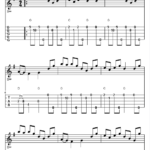
Understanding Gospel Music
A Unique American Invention, Black Gospel Music lyrics and songs are universally uplifting
If someone isn’t familiar with gospel music, they probably won’t think of it as being so deeply rooted in American culture. Maybe they would think of the music that is often heard in black Churches, or of the movie “O Brother, Where Art Thou?” might pop into mind.
While one might recognize the importance of music to certain niche groups in society, they wouldn’t rate it as influential as Rock, Jazz, Rap or Country.
Most people don’t realize, but it is well-known in the gospel music industry that “Gospel music” is not a single genre. Gospel music encompasses many sounds, styles and messages. The simplistic label of “God music” is not appropriate. Understanding the history and impact of Gospel can provide valuable insights into American culture.
Black Gospel, Southern Gospel Explained
Black Gospel was, and is still, primarily about God. Southern Gospels tend not to address God. These two genres also differ greatly from other Christian music. They are often confused. Gospel’s rich history is complex. To simplify it, let’s consider it from two perspectives. Let’s take the first examples and look at black Church music and the sounds that people associate with O Brother Where Art Thou. These two perspectives sum up the fundamental roots of Gospel music as a fusion of early American white culture and black culture.
Similar Roots to Jazz
Black church music is the most well-known example of gospel music people know. Similar to Jazz, this music has its roots in slave spirituals that were sung during the 19th century. It continues to evolve through songs written in labor camps during the 20th century. It is distinct from secular jazz music.
Segregation Breeds Invention
Black churches developed a distinct culture due to America’s segregation in the mid- and early 20th century. The oral tradition of black spirituals has been cultivated and merged with religious connotations to make it a part of churches. Although these spirituals were a part of church life for many years, they never saw commercialization until the latter half of the 20th century. Black gospel, which was first exposed in film and some pop music (most notably Madonna’s “Like a Prayer”), has been a significant part of American culture.
Southern Gospel is an American tradition that has been ingrained in American culture in a similar way to the Gospel. However, its evolution is surprising. Imagine George Clooney singing in “Oh Brother, where art Thou?” He sings a type of music that is representative of one of few musical genres that has remained popular since the dawn of sound recording. This music is a mix of black gospel spirituals and puritan heart song. This was a capella music that was accepted in Puritan society. It was often sung to praise God and spirituality. Now, it’s been 150 years since the invention of recorded songs and radio. The easy-to-understand, catchy, and upbeat sounds of quartet music quickly gained popularity with listeners.
It is important to note that although Southern Gospel is different than ‘black’ Gospel it doesn’t necessarily mean that one is only for white people. Many early quartets had members of either black or mixed race. These quartets provided black entertainers with a way to get mainstream attention and recognition, even though Black Gospel was not popular outside of black culture for many decades.
More Popular Than Ever
Nearly 100 years later, much of Southern Christian Gospel is still the same. Although it lost its popularity in the middle century, Bill and Gloria Gaith managed to revive the genre in the early 1990’s with a huge national tour. This led to a new movement, Progressive Christian Gospel. It combines elements of bluegrass, country, pop, and traditional Southern Gospel with modern Christian music. This evolution has made it more accessible and popular, especially among younger listeners.
Even though it is a closed group, Southern Christian Gospel continues to be one of the most loved forms of music in the country. Its influence has been extended to other countries, including Ireland (List others). The spiritual and aesthetic characteristic of American society is more than the Southern Christian Gospel.



